
Rugby union in Burkina Faso is a minor but growing sport.

Rugby union in Burkina Faso is a minor but growing sport.
The governing body is affiliated to the Confederation of African Rugby, they became full members of World Rugby in 2020. [1] [2]
Rugby union was introduced into Upper Volta, as it was then, by the French, who ruled the country for a number of years.
As with many minor rugby nations, the sport is centred on the national capital - Ouagadougou. Burkina Faso rates second last on the Human Development Index, which means it is extremely poor, and lacks the infrastructure that would improve its rugby standing.
The national coach of the Burkina Faso rugby team is Laurent Stravato. They just won the African cup of 7s in 2014.
Like many African countries, the historical connection with France is a mixed blessing. For a number of years, Burkinabé rugby players would leave to play there, which deprived rugby in Burkina Faso of any real competition. As an example, one of the most notable Burkinabé players was Fulgence Ouedraogo, who played for the France national rugby union team, but would have qualified for the Burkina Faso national rugby union team. [3] Ouedraogo left Burkina Faso at an early age, and started playing rugby at the age of 6, meeting his MHRC teammate François Trinh-Duc, at the Pic-Saint-Loup rugby school near Montpellier. [4]
The Burkina Faso women's team played their first test match on 9 June 2021 against Cameroon at Ouagadougou, they have been playing international sevens rugby since 2006. (Current playing record).

Burkina Faso is a landlocked country in West Africa. It covers an area of 274,223 km2 (105,878 sq mi), bordered by Mali to the northwest, Niger to the northeast, Benin to the southeast, Togo and Ghana to the south, and Ivory Coast to the southwest. As of 2021, the country had an estimated population of 23,674,480. Previously called the Republic of Upper Volta (1958–1984), it was renamed Burkina Faso by president Thomas Sankara. Its citizens are known as Burkinabè, and its capital and largest city is Ouagadougou.

Jean-Baptiste Philippe Ouédraogo, also referred to by his initials JBO, is a Burkinabé physician and retired military officer who served as President of Upper Volta from 8 November 1982 to 4 August 1983. He has since mediated a few national political disputes and operates a clinic in Somgandé.
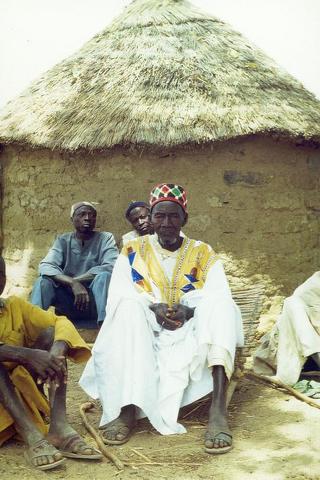
The Mossi are a Gur ethnic group native to modern Burkina Faso, primarily the Volta River basin. The Mossi are the largest ethnic group in Burkina Faso, constituting 52% of the population, or about 11.1 million people. The other 48% of Burkina Faso's population is composed of more than 60 ethnic groups, mainly the Gurunsi, Senufo, Lobi, Bobo, Bissa and Fulani. The Mossi speak the Mòoré language.
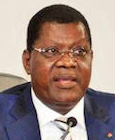
Youssouf Ouédraogo was a Burkinabé politician. In 1992 he became the first Prime Minister of Burkina Faso since 1983, serving from 16 June 1992 to 22 March 1994. Ouédraogo, a member of the ruling Congress for Democracy and Progress (CDP), later served as Minister of State for Foreign Affairs from January 1999 to June 2007.
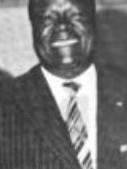
Gérard Kango Ouédraogo was a Burkinabé statesman and diplomat who served as Prime Minister of Upper Volta from 13 February 1971 to 8 February 1974. He was subsequently President of the National Assembly of Upper Volta from October 1978 to November 25, 1980.

Kadré Désiré Ouédraogo is a Burkinabè statesman. He was the Prime Minister of Burkina Faso from 1996 to 2000 and Chairman of the Commission of the Economic Community of West African States (ECOWAS).

Rugby Africa is the administrative body for rugby union within the continent of Africa under the authority of World Rugby, which is the world governing body of rugby union. As of 2018, Rugby Africa has 37 member nations and runs several rugby tournaments for national teams, including the Africa Cup which is the main 15-a-side competition for African national teams.
Articles related to Burkina Faso include:
Ablassé Ouédraogo is a Burkinabé economist, diplomat and politician. Ouédraogo served as Minister of Foreign Affairs for Burkina Faso between 1994 and 1999. He is the founder of the Alternative Faso party and has served as its president since 2012, and was elected president of the National Union for Democracy and Development on 8 September 2018.

Football is the most popular sport in Burkina Faso. And the national association can look back on recent developments with a great deal of pride. Reaching the semi-finals of the African Cup of Nations on home soil in 1998, reaching the knockout stage for their first FIFA World Youth Championship in 2003, and appearances at two final competitions of the CAF U-17 Cup, as well as third place at the FIFA U-17 World Championship in Trinidad and Tobago in 2001 are the country's outstanding achievements at international level. The nations most famous players include Kassoum Ouegraogo, nicknamed Zico, who had his most successful seasons with Espérance de Tunis before ending his career in Germany, Siaka Ouattara, who spent his entire career with Mulhouse in France, and Moumouni Dagano, who was voted best African player in Belgium in 2001, when he played for the Belgian side Genk. He later went on to play for the French side Guingamp before transferring to another French team, FC Sochaux in 2005. Burkina Faso received an unexpected free pass into the group stage of the 2006 FIFA World Cup qualification process, when their opening round contestant, the Central African Republic, withdrew from the competition. This gave the West Africans, who were at that stage ranked 14th on the continent, the certainty that their name would be in the hat when the Preliminary Draw for the 2006 FIFA World Cup in Germany was made. They got off to a flying start, beating Ghana 1-0 in their opening match and laying down a marker for their Group 2 adversaries South Africa, Cape Verde Islands, Congo DR and Uganda. The victory train began to come off the rails with two defeats to Cape Verde, and with a record of two wins and three losses, Burkina Faso were up against it at the half-way stage. Frenchman Bernard Simondi took over the coaching reins from Ivica Todorov and made the team harder to beat at home, even recording wins over South Africa and Congo DR, but in the end it was not quite enough, and the likes of Abdoulaye Cisse, Moumouni Dagano, and Wilfred Sanou went no further in the competition.

Sport in Burkina Faso is widespread and includes football, basketball, baseball, cycling, rugby union, handball, tennis, athletics, boxing, and martial arts.
Rugby union in Mauritania is a minor but growing sport.
Joseph Ouédraogo was a Burkinabè trade unionist and politician, active during the last years of the French Upper Volta and subsequently in the Republic of Upper Volta.
Hermann Hyacinthe Ouédraogo is a Burkina Faso football player who is currently playing for Union Sportive de Ouagadougou.

The Africa Women's Sevens is the continental championship for women's international rugby sevens in Africa. The tournament sanctioned and sponsored by Rugby Africa which is the rugby union governing body for the continent.
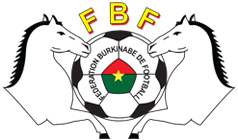
The Burkina Faso women's national football team represents Burkina Faso in international women's football. It is governed by the Burkinabé Football Federation. It played its first match on 2 September 2007 in Ouagadougou against Niger and won 10–0, the best result till today. Its next matches were against Niger (5–0) and Mali (2–4).
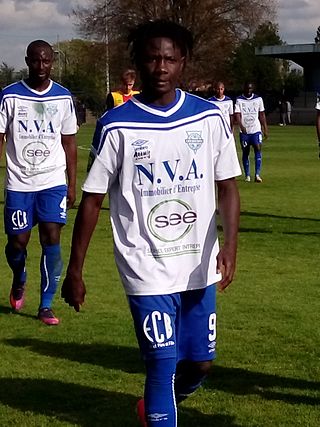
Soutongo Louckmane Ouédraogo is a Burkinabé professional footballer who plays as a winger for French club CS Chaumontois.

Issoufou Sellsavon Dayo is a Burkinabé professional footballer who plays as a centre-back for RS Berkane and the Burkina Faso national team. Issoufou Dayo featured in the AFCON 2021 third place game against Cameroon.
The Cameroon women's national rugby union team are a national sports team that represents Cameroon in women's international rugby union. They played their first test match against Burkina Faso in 2021.